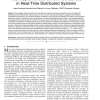Free Online Productivity Tools
i2Speak
i2Symbol
i2OCR
iTex2Img
iWeb2Print
iWeb2Shot
i2Type
iPdf2Split
iPdf2Merge
i2Bopomofo
i2Arabic
i2Style
i2Image
i2PDF
iLatex2Rtf
Sci2ools
141
click to vote
TC
2002
2002
Fast Asynchronous Uniform Consensus in Real-Time Distributed Systems
We investigate whether asynchronous computational models and asynchronous algorithms can be considered for designing real-time distributed fault-tolerant systems. A priori, the lack of bounded finite delays is antagonistic with timeliness requirements. We show how to circumvent this apparent contradiction, via the principle of "late binding" of a solution to some (partially) synchronous model. This principle is shown to maximize the coverage of demonstrated safety, liveness, and timeliness properties. These general results are illustrated with the Uniform Consensus (UC) and the Real-Time UC problems, assuming processor crashes and reliable communications, considering asynchronous solutions based upon Unreliable Failure Detectors. We introduce the concept of Fast Failure Detectors and we show that the problem of building Strong or Perfect Fast Failure Detectors in real systems can be stated as a distributed message scheduling problem. A generic solution to this problem is give...
Failure Detectors | Fast Failure | Information Technology | TC 2002 | Unreliable Failure Detectors |
Related Content
| Added | 23 Dec 2010 |
| Updated | 23 Dec 2010 |
| Type | Journal |
| Year | 2002 |
| Where | TC |
| Authors | Jean-François Hermant, Gérard Le Lann |
Comments (0)

